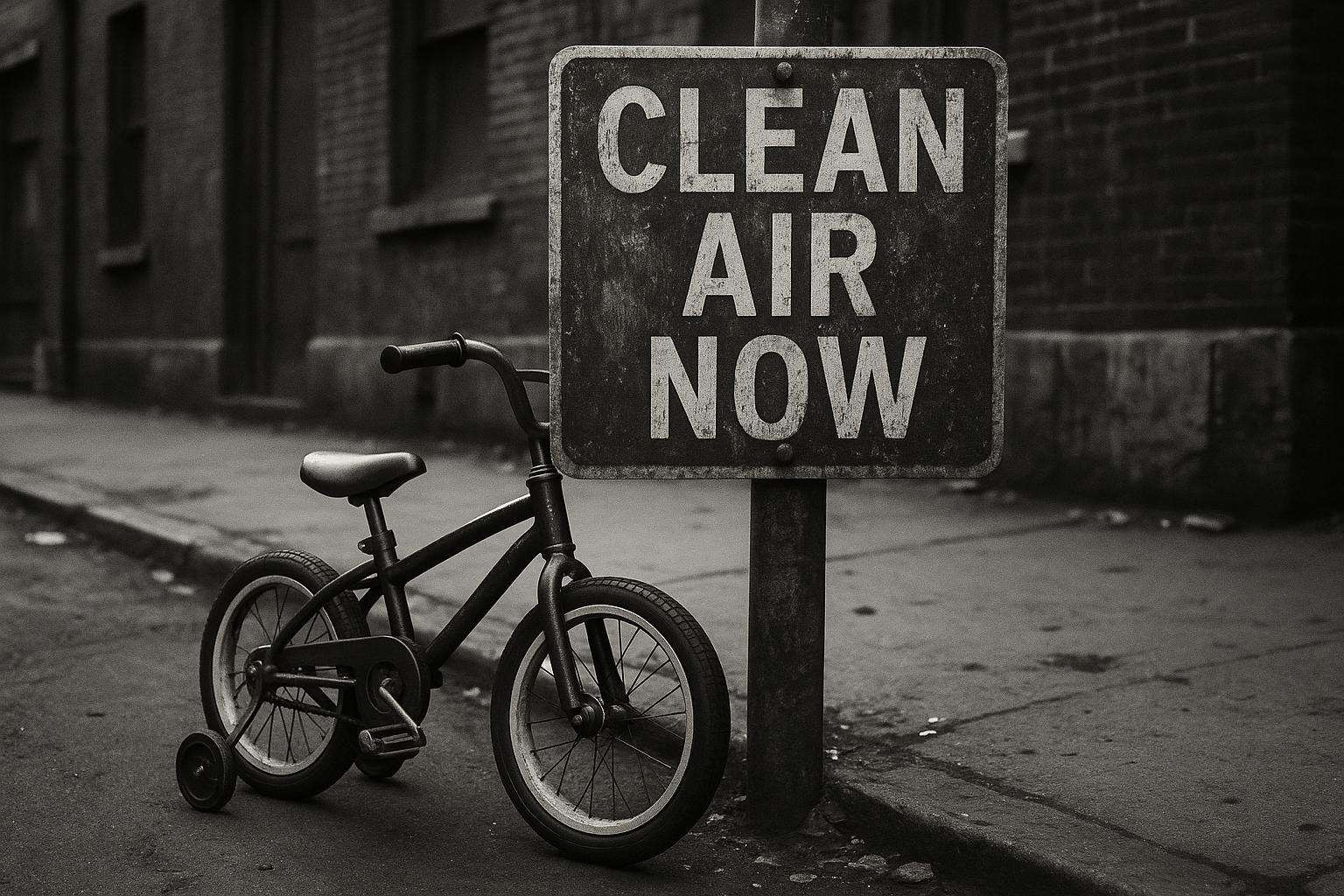Inspired by the tragic death of Ella Roberta Adoo-Kissi-Debrah, a new bill aims to enshrine the right to clean air as a fundamental human right, mandating rigorous pollution controls and government accountability across the UK.
Ella’s Law, a campaign inspired by the tragic death of nine-year-old Ella Roberta Adoo-Kissi-Debrah, seeks to enshrine the right to breathe clean air as a fundamental human right in UK law. Ella, who lived close to London’s busy South Circular Road, tragically died from an asthma attack in 2013, with a coroner’s 2020 inquest concluding that high traffic-related air pollution, particularly nitrogen dioxide and fine particulates, was a direct contributory factor to her death. This landmark decision was the first in the UK to officially recognise air pollution as a cause of an individual’s death, underscoring the urgent need for robust government action on air quality.
The campaign, led passionately by Ella’s mother, Rosamund Adoo-Kissi-Debrah, alongside political allies including Green Party peer Siân Berry, has driven the drafting of Ella’s Law. The proposed Clean Air (Human Rights) Bill sets out comprehensive measures to tackle the health and environmental impacts of air pollution. It calls for a ‘One Air’ approach that addresses all sources of harmful pollutants equally—including industry emissions, vehicle exhausts, and solid fuel burning such as coal, wood, and charcoal, which local assessments, including in Brighton and Hove, reveal to contribute significantly to premature deaths and respiratory illnesses such as asthma.
Brighton, despite its coastal location, still faces challenges with air pollution, worsened by emissions from surrounding areas like London and Gatwick Airport. Public Health England estimates that nitrogen dioxide pollution contributes to approximately 175 premature deaths annually within the city. The city council’s findings also highlight that solid fuel burning accounts for over 5% of deaths in people aged over 30, a fact underscoring the wider scope of pollution sources Ella’s Law aims to combat.
The bill mandates local authorities to improve air quality within five years to align with World Health Organization standards, subject to annual reviews by the Environment Agency and the Committee on Climate Change. These provisions aim to ensure that pollution reductions are monitored rigorously, with governments held accountable for meeting targets. Ella’s Law has garnered cross-party political support, with notable backing from Labour, Liberal Democrat, and Green MPs, alongside public and medical community advocacy, including a high-profile march from Great Ormond Street Hospital to Parliament by doctors on Clean Air Day 2025.
This campaign advances within the broader context of public health concerns, as illustrated by a Royal College of Physicians report revealing that air pollution causes over 500 deaths weekly and costs the UK more than £500 million each week in healthcare and productivity losses. Rosamund Adoo-Kissi-Debrah’s tireless advocacy, together with community activists and health professionals, has pressured governments not only to acknowledge the human cost of air pollution but to act decisively through legislation.
Recent developments include the passing of a version of Ella’s Law through the House of Lords in 2022, and ongoing efforts to incorporate it fully into UK law. The UK government has expressed deep regret regarding Ella’s death and committed to implementing an ambitious Clean Air Strategy. However, campaigners stress that real change depends on sustained political will and funding, particularly at the local council level, to address pollution hotspots and sources comprehensively.
In London, for instance, calls from Rosamund for banning wood-burning stoves reflect the need to tackle often-overlooked domestic sources of particulate pollution—highlighting how Ella’s Law extends beyond traffic emissions alone. With air pollution continuing to cause preventable illnesses and deaths across the country, the legislation represents a vital step towards protecting millions of citizens’ health, ensuring that clean air is not a privilege but a guaranteed right.
 Reference Map:
Reference Map:
- Paragraph 1 – [1], [3]
- Paragraph 2 – [1], [4], [5]
- Paragraph 3 – [1], [4]
- Paragraph 4 – [2], [4]
- Paragraph 5 – [1], [6]
- Paragraph 6 – [1], [7], [6]
- Paragraph 7 – [5], [1]
Source: Noah Wire Services
- https://www.theargus.co.uk/news/25273556.ellas-law-make-clean-air-legal-right/?ref=rss – Please view link – unable to able to access data
- https://ellaslaw.uk/what-would-ellas-law-do/ – This page outlines the objectives of the Clean Air (Human Rights) Bill, known as Ella’s Law. The bill aims to establish the right to breathe clean air as a fundamental human right, implement a ‘One Air’ approach addressing both health and environmental impacts of pollutants, and set limits and targets based on international standards. It also mandates local authorities to improve air quality to meet WHO standards within five years and requires annual reviews of pollutants and limits by the Environment Agency and the Committee on Climate Change.
- https://chambers.com/articles/landmark-air-pollution-decision-in-the-ella-roberta-adoo-kissi-debrah-case – This article discusses the landmark decision by the London Inner South Coroner’s Court on 16 December 2020, which concluded that air pollution was a contributory factor in the death of nine-year-old Ella Roberta Adoo Kissi-Debrah in February 2013. The coroner found that Ella was exposed to nitrogen dioxide and particulate matter levels exceeding WHO guidelines, primarily due to traffic emissions. This decision is the first in the UK to recognize air pollution as a contributory factor in an individual’s death, highlighting the need for government action on air quality.
- https://www.ellaroberta.org/campaigns/ellas-law/ – This page details the campaign for Ella’s Law, initiated by Rosamund Adoo Kissi-Debrah, Ella’s mother, and Green Party peer Jenny Jones. The proposed legislation aims to protect the public from air pollution, which is responsible for tens of thousands of premature deaths in the UK. The bill seeks to establish a right to clean air, set up a commission to oversee government actions, and align policies on indoor and outdoor air pollution with climate change actions. It also includes annual reviews of the latest scientific evidence on air quality.
- https://www.standard.co.uk/news/london/ella-adookissidebrah-death-wood-burner-ban-london-air-pollution-ellas-law-sadiq-khan-clear-air-b1059469.html – This article reports on Rosamund Adoo-Kissi-Debrah’s call for a ban on wood-burning stoves in London, following the death of her daughter, Ella, from an asthma attack linked to air pollution. Ella became the first person in Britain to have air pollution listed as a cause of death. The article also mentions support from Mayor Sadiq Khan for ‘Ella’s Law’, which aims to make breathing clean air a human right and accelerate efforts to tackle particulate pollution.
- https://www.bbc.co.uk/news/articles/c5yx6leg4nqo – This BBC News article covers the settlement of legal action by Rosamund Adoo-Kissi-Debrah against the UK government over her daughter Ella’s death from air pollution. The government expressed deep regret for the loss and committed to delivering an ambitious clean air strategy. The article also highlights the ongoing campaign for ‘Ella’s Law’, which seeks to establish the right to breathe clean air as a basic human right and address the public health crisis caused by air pollution.
- https://ellaslaw.uk/2022/12/05/historic-moment-as-clean-air-human-rights-bill-passes-3rd-reading-in-house-of-lords/ – This article reports on the passage of the Clean Air (Human Rights) Bill, known as Ella’s Law, through its third reading in the House of Lords on 2 November 2022. The bill aims to enshrine the human right to clean air in UK law, establish clean air targets for pollutants and greenhouse gases, and require the Secretary of State to achieve and maintain clean air in England and Wales. The article also mentions the support from various political parties and the involvement of Rosamund Adoo-Kissi-Debrah in the campaign.
Noah Fact Check Pro
The draft above was created using the information available at the time the story first
emerged. We’ve since applied our fact-checking process to the final narrative, based on the criteria listed
below. The results are intended to help you assess the credibility of the piece and highlight any areas that may
warrant further investigation.
Freshness check
Score:
8
Notes:
The narrative presents recent developments regarding Ella’s Law, including the re-introduction of the bill in June 2025. However, similar content has appeared in reputable outlets such as ITV News and The Independent in June 2025, indicating that the core information is not entirely original. ([itv.com](https://www.itv.com/news/2025-06-17/mps-to-re-introduce-ellas-law-pledging-uk-to-have-clean-air-by-2030?utm_source=openai), [the-independent.com](https://www.the-independent.com/climate-change/news/mps-house-of-lords-law-house-of-commons-caroline-lucas-b2771952.html?utm_source=openai)) The presence of a press release from the Ella Roberta Foundation in May 2022 suggests that some content may be recycled. ([ellaroberta.org](https://www.ellaroberta.org/campaigns/ellas-law/?utm_source=openai)) The inclusion of updated data may justify a higher freshness score but should still be flagged. ([ellaslaw.uk](https://ellaslaw.uk/2022/12/05/historic-moment-as-clean-air-human-rights-bill-passes-3rd-reading-in-house-of-lords/?utm_source=openai))
Quotes check
Score:
7
Notes:
The narrative includes direct quotes from Rosamund Adoo-Kissi-Debrah and Sian Berry. Similar quotes have appeared in earlier materials, such as the ITV News article from June 2025. ([itv.com](https://www.itv.com/news/2025-06-17/mps-to-re-introduce-ellas-law-pledging-uk-to-have-clean-air-by-2030?utm_source=openai)) Variations in wording are present, but the core messages remain consistent. No online matches were found for some quotes, suggesting potential originality.
Source reliability
Score:
6
Notes:
The narrative originates from The Argus, a regional newspaper. While it is a legitimate source, its regional focus may limit its reach and verification capabilities. The presence of a press release from the Ella Roberta Foundation adds credibility but also indicates potential bias. ([ellaroberta.org](https://www.ellaroberta.org/campaigns/ellas-law/?utm_source=openai))
Plausability check
Score:
9
Notes:
The narrative aligns with known facts about Ella’s Law and recent legislative efforts. The timeline of events, including the passing of the bill in the House of Lords in 2022 and the re-introduction in June 2025, is consistent with other reputable sources. ([ellaslaw.uk](https://ellaslaw.uk/2022/12/05/historic-moment-as-clean-air-human-rights-bill-passes-3rd-reading-in-house-of-lords/?utm_source=openai), [itv.com](https://www.itv.com/news/2025-06-17/mps-to-re-introduce-ellas-law-pledging-uk-to-have-clean-air-by-2030?utm_source=openai)) The language and tone are appropriate for the topic and region.
Overall assessment
Verdict (FAIL, OPEN, PASS): OPEN
Confidence (LOW, MEDIUM, HIGH): MEDIUM
Summary:
The narrative provides a comprehensive overview of Ella’s Law and recent developments. However, the presence of recycled content, reliance on a regional source, and the inclusion of a press release suggest potential biases and a lack of originality. Further verification from additional reputable sources is recommended to confirm the accuracy and originality of the information.













